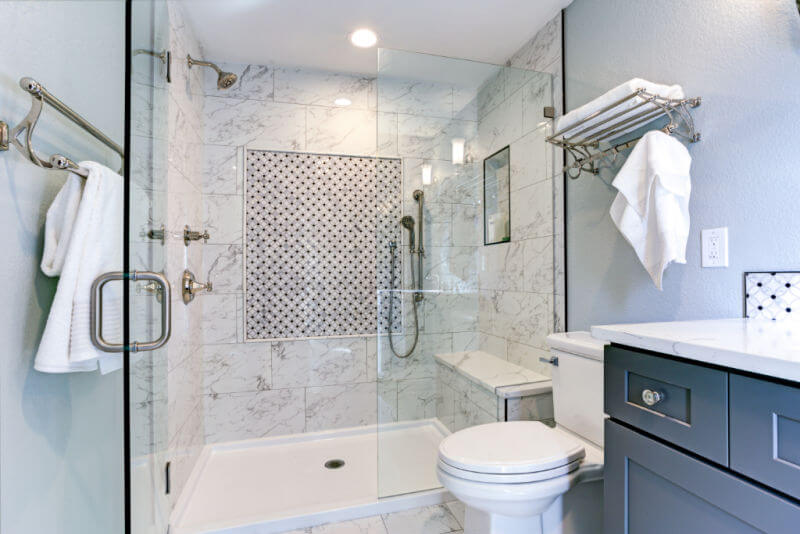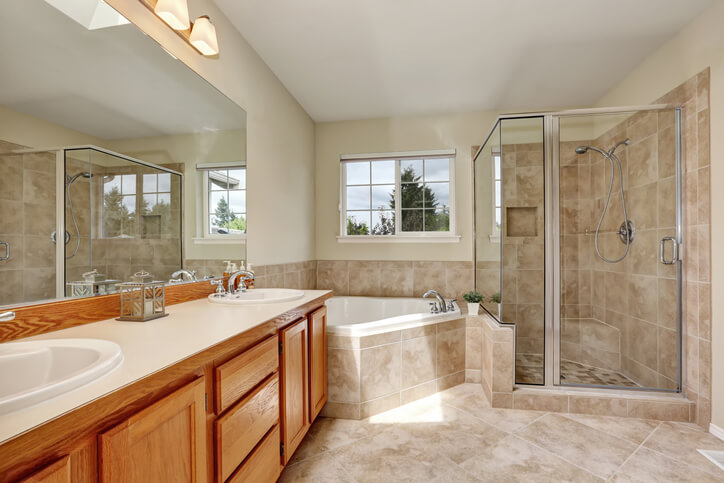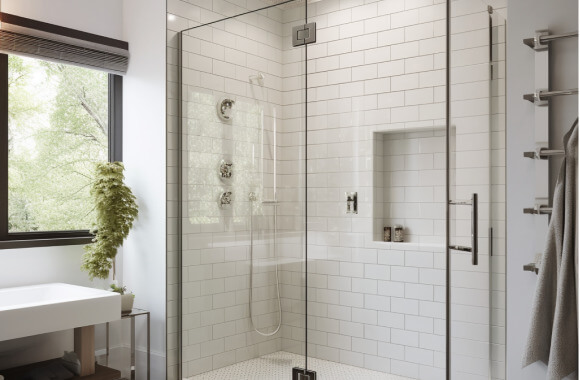Whether you’re renovating your whole bathroom or just remodeling your shower, upgrading your shower door can make a big difference to the look and feel of your space. In this blog, we’ll cover the differences and the pros and cons between two popular styles: frameless vs framed shower doors. Let’s take a look at what each is, their functionality, how much cleaning and maintenance they each need, and what they cost.
Understanding Frameless and Framed Shower Doors
To start, let’s look at what these shower door types actually are and the difference in how they’re constructed.
What Are Frameless Shower Doors?
Frameless shower doors do not have a metal frame around the outside or on any part of the door(s). Instead, they are made of thick, tempered glass that is sturdy enough to support itself. This design provides a clean, unobstructed view, making your bathroom appear more spacious and elegant.

What Are Framed Shower Doors?
Framed shower doors have a thinner glass pane encased in a metal frame which provides structural support and stability. The frames are usually made of aluminum or composite materials and can come in various finishes to match your bathroom’s décor.

What Are the Pros and Cons of Each Type?
Frameless Shower Doors
-
Pros
- Aesthetic Appeal
- Customization
- Easy to Clean
-
Cons
- Cost
- Difficult Installation
- Potential for Leaks
Pros
- Aesthetic Appeal: Frameless doors offer a modern, minimalistic look that can make your bathroom appear larger and more sophisticated.
- Customization: They can be customized to fit any size and shape, offering more flexibility in design.
- Easy to Clean: The absence of a frame means fewer places for water and soap scum to accumulate, making them easier to clean.
Cons
- Cost: Frameless doors are generally more expensive due to the thicker glass and the specialized hardware required for installation.
- Difficult Installation: They require precise installation, which can be more complex and time-consuming.
- Potential for Leaks: Without a frame, there can be a higher risk of water escaping from the shower.

Framed Shower Doors
-
Pros
- Cost-Effective
- Leak Prevention
- Durability
-
Cons
- Cleaning Difficulty
- Aesthetic Limitations
- Customization Limitations
Pros
- Cost-Effective: Framed doors are typically less expensive, making them a budget-friendly option.
- Leak Prevention: The frame provides a tight seal that helps prevent water from leaking out.
- Durability: The frame adds extra strength and stability, making these doors more resilient to impact.
Cons
- Cleaning Difficulty: The frame can collect water, soap scum, and mildew, requiring more meticulous cleaning.
- Aesthetic Limitations: The presence of a frame might not align with modern bathroom designs and can visually segment the space.
- Customization Limitations: They are often available in standard sizes and shapes, which might not fit all bathroom layouts.

Average Cost Comparison
The cost of both frameless and framed shower doors varies depending on the size, material, and design complexity. However, on average, frameless shower doors cost more in both materials and labor than framed.
Frameless shower doors can cost between $600 and $1,200, while framed shower doors typically range from $300 to $500.
Are Framed or Frameless Shower Doors Better?
It depends on what your definition of “better” is. If you are looking for a modern feel and less cleaning, then a frameless shower door is better for you.

If you are looking for something that is virtually leak-proof and budget-friendly, then a framed shower door is better for you.

Here’s how you should make your decision.
Consider Your Budget
If you are working with a limited budget, framed shower doors might be the more economical choice. However, if you are willing to invest more for a luxurious look, frameless doors could be worth the expense.
Think About Your Bathroom’s Style
For modern, minimalist bathrooms, frameless shower doors can enhance the aesthetic. In contrast, framed doors might suit traditional or classic bathroom designs better.
Evaluate Maintenance Preferences
If you prefer easy maintenance and cleaning, frameless doors are advantageous. But if you don’t mind the extra effort, framed doors can be a practical choice.
Assess Your Space
Consider the layout and size of your bathroom. Frameless doors can make a space feel larger, while framed doors might work better in smaller, more traditional spaces.
Consult with Professionals
Before deciding, talk to a contractor. They can provide insights based on your specific bathroom layout, style preferences, and budget.
The Final Word on Frameless vs. Framed Shower Doors
Choosing between frameless and framed shower doors depends on a variety of factors including budget, design preference, maintenance considerations, and bathroom layout.
While frameless doors offer a modern, elegant look and are easier to clean, they are typically more expensive and require careful installation.
Framed doors are more cost-effective, provide a tighter seal, but might be less appealing in a contemporary bathroom design and require more effort in cleaning.
Ultimately, the decision should align with your personal style, needs, and budget.
The post Frameless vs. Framed Shower Doors: Which Is Better? appeared first on Modernize.

